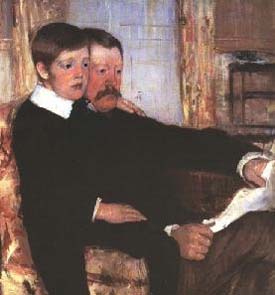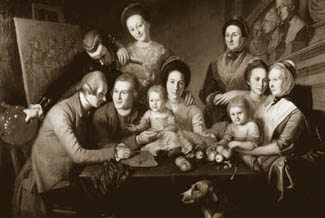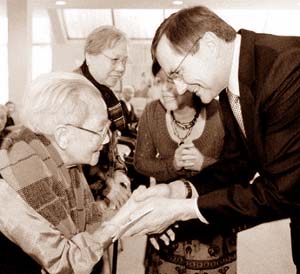 |
Formation of Children
The Family Milieu
Marian T. Horvat, Ph.D.
The tone of the Catholic family that this Chapter 20 of the Small Manual of Civility encourages families to establish is one of a natural and modest restraint.
First, it is important to note that the Catholic home should not only be a serious place but it also has something sacred in it, and as such it should be treated with respect. It is not a place for children to jump on the furniture, flop on the couch and chairs, or run around barefoot and half-dressed. The unfortunate modern tendency to idolize casual living and comfort has slowly undermined the seriousness and sound customs of the past that emphasized a serene orderliness, which instilled harmony and happiness in the home.
Second, this natural restraint was also present in the relations among the family members. In a family ambience marked by the spirit of Catholic affection, there was a profound natural respect of youth for their parents and elders. Young men were raised also with the notion that, as men, it was their obligation to protect and assist their mother and sisters. This respect for the dignity of others manifested itself in all the familial relations.
For a son to be confident, calm and secure, a father and mother must show a stable seriousness in the day-to-day relations with their children. If they are constantly playing, joking, and making life look like a game, they teach their children not only that life is not serious, but that authority is frivolous and clownish.
St. Francis de Sales noted that the affection borne by fathers to their children is not called friendship, because friendship supposes a certain equality in vocation, rank, or aims. This equality, he continued, should not exist in the affection of fathers for their children. The love of fathers is, he says, a majestic love, and that of children a love of respect and submission. Everything in a Catholic society, the manner of being, the speech, the gestures, even the way of dressing, used to reflect this wise thinking.
This chapter is an invaluable call for Catholic parents and youth to re-think the American tendency to be casual, and begin to cultivate a ceremonial Catholic spirit.
The family should be the first school of civility. Everything in it is sacred and therefore worthy of respect, not only the parents, representatives and depositaries of divine authority, but also the dwelling itself, the paternal home, the place where one lives and sleeps.

The family furniture should not be used for jumping |
Since the home is the image and reflection of the family, it should be honored. Family members should guard its cleanliness and decorum, and everyone should live in it with dignity, discretion and restraint. How blameworthy would be one who dishonors the family, or introduces discord, conflict and deceit into it. By the manners and relations that reign between the parents and children, one can judge the degree of dignity and culture that exist in a family, just as one can know the virtues practiced in it.
Further, future citizens are formed in the image of the domestic virtues. The future of a nation depends, therefore, on the good constitution of the family, the first social cell, in which respect, reciprocal love, mutual abnegation, and solidarity should reign and flourish. These virtues radiate from this nucleus through the entire society. Strong families are the bastion that protects the happiness of the whole.
Honor thy parents
To love and respect one’s parents is a divine precept: “Honor thy father and mother.” It would be callous, foolish and unnatural for a child not to fulfill this duty toward those who, after God, give them all the goods that come to them. Who could calculate the total sum of the labors, sacrifices, suffering, and care that parents take upon themselves for their children? A son can never pay, so to speak, the debt of blood, sustenance and education that he received. He will remain eternally a debtor to those who sacrificed for him.
Youth should pay no attention to certain revolutionary and anti-natural theories about the independence of children, in which the State-God replaces the parents. This nefarious doctrine breaks the natural bonds that bind family members together. These egalitarian teachings serve to dissolve homes, destroy the barriers of respect and love, and make a blessed sanctuary into a den of discord or a kind of inn whose inhabitants receive food and bed, but nothing more.

The good father merits respect and affection |
First, the father must acknowledge God as the origin of his authority, and then affirm such authority, or the children easily will become insubordinate and rise up against him. If he allows his children to impose their own wills on the household, they will have the tendency to lose respect for him. The children will become egoists, and the father will be humiliated, submitting to the demands and impertinences of the children. The mother will also suffer, bearing the ingratitude and capriciousness of those so dear to her. The balance of the family will become upset because paternal authority is lacking.
The manners of youth should be the same whether they are at home or outside of it. Some young men make great efforts to appear amiable, respectful and helpful outside the home, giving the impression of being fine, upstanding youth. When, however, they enter the family circle, they forget their principal duties. They abruptly change their way of being, they take on an acid, somber and taciturn air. They are disagreeable, short in speech, disposed to quarrel. Their exterior is untidy, their dress disordered, and they fall into impolite silences. They act as if they were confined in a penitentiary, not enjoying the company of the persons of their home. This spirit destroys family life, turning what should be for all a small Eden into a kind of purgatory.
The well-bred young man
The well-bred child, on the contrary, contributes to the happiness of the family circle by his very presence. He does his part to see that everything is velvet carpeted - in his way of being, gestures, words, expressions and attitudes regarding the other family members.
In the morning at first encounter, he greets his mother or father and receives their blessing. At night, upon retiring, he observes the same ceremonial. He does not absent himself from the home without previous warning or permission, in accordance with his age. He appears at the table at the proper hour, because being a member of the domestic society, he is obliged to observe the schedule established by the head of the family. He passes many hours of Sundays and holy days with his family, engaging in the good conversations that pertain to family matters or touch on business, politics and civil life. By hearing the judgments of his elders about persons and things, he broadens his ideas, fortifies his own judgment, and, something that is very important, takes on the spirit of the family, which is a sacred legacy for a good son.
A well-bred young man often accompanies members of his family on outings and visits. He is the diligent and distinguished companion of the father. He is the protective support for his mothers and sisters, opening doors for them, drawing out their chairs at the table, careful in his words and actions not to offend their more delicate sensibilities. He tries to interest them with an amiable tone and conversation.

Amiability and harmony shine in this family portrait of
a Colonial American family |
In the bosom of the family, he is quick to obey, listens with respect and docility to the counsels of his parents, confiding in their experience. When it is appropriate, he share his thoughts, hopes, and dreams of the future with his parents, and gratefully accepts the guidance they offer him.
How different is the behavior of the unnatural, disrespectful and unloving child. We see him full of himself, infatuated with his personality, imagining himself superior to his parents in qualities or knowledge, speaking to them arrogantly, treating them with a certain air of scorn, disputing with them, denying their assertions, berating them at times for what he considers the manias of the older generation.
Such a son is unhappy and scorned by good men. Society should shun him. Certainly he is heading for great unhappiness in life.
Love and respect for siblings
Among the children of the same family, a constant respect and sincere love should reign. Brothers and sisters should love one another since they share the same name, the same blood, the same traditions and the same virtues from their common moral patrimony.
The eldest should give good example and protection to the others. Boys owe their sisters a respectful, delicate love, by which they should avoid causing them annoyance and disgust. They should be their natural and vigilant protectors, rendering them services and convenient assistance, such as lightening their work, carrying their packages or heavy things, always ceding to them the better seat. It is in the practice of fraternal charity in the home that a boy learns the first and best lessons of civility.
Respect for elders
All these laws apply to the relations of grandsons and their grandparents. Their advanced age is all the more reason for virtuous and well-bred children to show them veneration and respect.

A well-bred man shows respect for the elderly |
Parents should always be addressed by their proper titles: Father or Mother, or Papa or Mama, or similar terms of address. These words are sacred and signify both respect and affection. Children should never address their parents by their first names, or in vulgar or common terms, such as “old man” or “old woman.”
The good son loves his parents not because of their fortune or social position, but because they are for him the representatives of God. For this reason, if they should fall into misfortune, he would redouble his affection and do everything he could to ease their burden in life. Acting in this way, he is certain that he will become more worthy of the blessing of his progenitors. He realizes the truth of the words of Scripture: “He that honors his father shall enjoy a long life: and he that obeys the father, shall be a comfort to his mother.”
The words of Holy Scriptures
Scriptures affirms the importance of honoring one’s parents:
“For God has made the father honorable to the children: and seeking the judgment of the mothers, has confirmed it upon the children.” (Eccles 3:3)
“Children, obey your parents in all things: for this is well pleasing to the Lord.” (Col 3:20)
“A wise son makes a father joyful: but the foolish man despises his mother.” (Prov 15:20)
“He that honors his mother is as one that lays up a treasure. He that honors his father shall have joy in his own children, and in the day of his prayer he shall be heard.” (Eccles 3: 5-6)
“He that fears the Lord, honors his parents, and will serve them as his masters that brought him into the world.” (Eccles 3:7)
“Honor thy father, in work and word, and all patience, that a blessing may come upon thee from him, and his blessing may remain in the latter end.”(Eccles 3: 9-10)
General guidelines for the young man
The first proof of love for parents is to render them obedience and submission in everything, except what is not licit. A son should never answer his parents with “No!” or “I don’t want to!”
In responding to parents, it is praiseworthy for young men to use the respectful “Yes, sir” or “No, Ma’am.”
Children should not be inopportune or demanding in their requests to their parents. It is even worse to show resentment should one receive a negative reply to some request.

A defiant youth, a burden to parents and society |
Avoid bothering or interrupting your parents when they are busy. If you need to interrupt them, always do so politely, “Excuse me, Mother, I’m sorry to bother you, but I need …” Do not contradict them or respond to their commands with dark looks or pouting expressions.
Do not speak of any family matters that can prejudice the honor of your parents or siblings. Do not broadcast their defects or criticize them to your friends. Instead, cover for them, excuse them, have compassion on them.
Avoid every expression or scorn or injury, as well as arrogant, resentful or impertinent words. In the Old Testament, God fulminated with words of death the sons who curse or swear at their parents.
Do not make disrespectful gestures in front of them, such as shrugging the shoulders, turning the back on them, shaking one’s head, stamping the feet, raising the voice, or what would be truly heinous, threatening or striking them.
Do not fall into sloppy or lazy habits or ways of dressing in the home. One shows respect for himself and his parents by being neat and tidy in the home, as well as outside of it. A young man should never be immodest or vulgar in his dress or attitudes.
Happy the children who faithfully fulfill these duties. They will be blessed by God. But, cursed will be those who are disobedient and disrespectful, who make the days of their parents bitter. They will bring upon themselves, even in this life, the contempt of God, a foretaste of the curses and punishments of the next life. Cursed be the son who does not honor his faith and mother, says Holy Scripture.

Posted November 1, 2007


Related Topics of Interest
 Introduction to the Small Manual of Civility Introduction to the Small Manual of Civility
 Chapter 2: Bearing Chapter 2: Bearing
 Chapter 3: How to Sit, Stand, Walk Chapter 3: How to Sit, Stand, Walk
 Chapter 4: Order and the Spirit of Order Chapter 4: Order and the Spirit of Order
 Chapter 5: Order in the Professional Life Chapter 5: Order in the Professional Life
 Chapter 6: The Eyes and the Gaze Chapter 6: The Eyes and the Gaze
 Chapter 7: Cleanliness and Good Hygiene Chapter 7: Cleanliness and Good Hygiene
 Chapter 8: The Smile, The Laugh, The Grimace Chapter 8: The Smile, The Laugh, The Grimace
 Chapter 9: The Art of Governing the Hands and Feet Chapter 9: The Art of Governing the Hands and Feet
 Chapter 10: The Voice - Speaking and Conversing Chapter 10: The Voice - Speaking and Conversing

Related Works of Interest
|
|
Formation | Cultural | Home | Books | CDs | Search | Contact Us | Donate

© 2002- Tradition in Action, Inc. All Rights Reserved
|
 |
|